

"Data Governance" Scorecard. The Cost of Bad Data is the Illusion of Knowledge. Data Quality Assessment: A Resource Guide — Data Quality Pro. Measuring Data Quality for Ongoing Improvement Laura Sebastian-Coleman provides an in-depth interview that outlines her approach to Data Quality Assessment and measurement, explaining the key difference between the two terms.
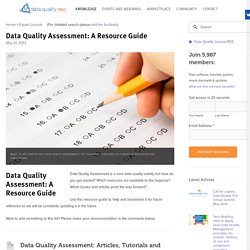
The Role of Data Quality Monitoring in Data Governance Jim Harris provides some useful examples of data quality rules as mapped against policies within a Data Governance framework. Nice example of how to link the rule process from end-to-end. Data Quality Rules: The Definitive Guide to Getting Started — Data Quality Pro. Data Quality Rules: A Management Primer for Taking Action — Data Quality Pro. Scenario B - Focused and Productive LLC.
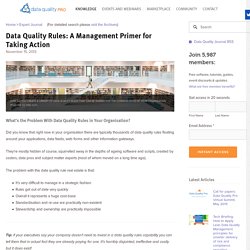
Company B has a formal data quality strategy and a series of contact data governance policies in place for ensuring correct management of contact data quality and associated rules.Whenever new applications or coding requirements are suggested, all requests are routed via the Data Quality Officer so their team can coordinate a response and ensure the correct standards and policies are required. Development and business teams don’t need to store hundreds of policies, the central data quality team simply provide the latest and most accurate resource information.Over time Company B has created a rich set of data quality rules in a hierarchical format that allows anyone to quickly navigate and copy the relevant rules for the contact data information they wish to store, retrieve, process or amend.All suppliers and 3rd party IT providers have to adhere to the data governance standards for data quality and contact data application design.
Get some buy-in. Une année historique pour SAP France, croissance à deux chiffres. Par Bertrand Garé, le 23 janvier 2014 16:10 En marge de l’annonce des résultats annuels de l’éditeur allemand, Franck Cohen, Président de SAP EMEA, est revenu sur les tendances en Europe et en France.
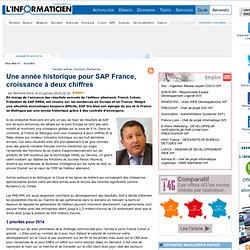
Malgré une situation économique toujours difficile, SAP tire bien son épingle du jeu et la France se distingue par une année historique grâce à des contrats d’envergure. Si les analystes financiers ont pris un peu de haut les résultats de SAP lors de leurs annonces, les détails sur la zone Europe ne sont pas sans intérêt et montrent une croissance globale sur la zone de 9 %. Dans ce contexte, la France se distingue avec une croissance à deux chiffres et la filiale réalise son meilleur trimestre historique sur les huit dernières années. Autres secteurs à se distinguer, le Cloud et les lignes de métiers qui connaissent des croissances spectaculaires durant cette dernière année avec là encore des contrats significatifs comme Burberry’s ou l’Oréal.
In Search of Information Governance in the Enterprise. It’s an understatement to say companies are drowning in digital information.
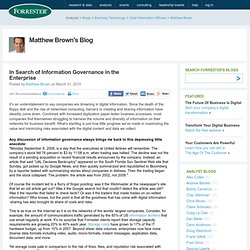
Since the death of the floppy disk and the rise of networked computing, barriers to creating and sharing information have steadily come down. Combined with increased digitization paper-laden business processes, most companies find themselves struggling to harness the volume and diversity of information on their networks for business benefit.
What’s startling is just how little progress we've made in maximizing the value and minimizing risks associated with the digital content and data we collect. Any discussion of information governance always brings me back to this depressing little anecdote: "Monday September 8, 2008, is a day that the executives at United Airlines will remember. Of course the incident led to a flurry of finger pointing: was it the Webmaster at the newspaper's site that let an old article get out? This is as true on the Internet as it is on the networks of the worlds’ largest companies. <Information Governance> Chapter 1. Using Google Refine to Clean Messy Data. Google Refine (the program formerly known as Freebase Gridworks) is described by its creators as a “power tool for working with messy data” but could very well be advertised as “remedy for eye fatigue, migraines, depression, and other symptoms of prolonged data-cleaning.”
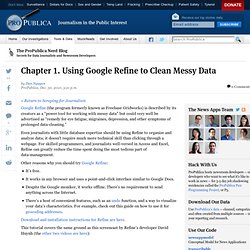
Even journalists with little database expertise should be using Refine to organize and analyze data; it doesn't require much more technical skill than clicking through a webpage. For skilled programmers, and journalists well-versed in Access and Excel, Refine can greatly reduce the time spent doing the most tedious part of data-management. Other reasons why you should try Google Refine: It’s free.It works in any browser and uses a point-and-click interface similar to Google Docs.Despite the Google moniker, it works offline. There’s no requirement to send anything across the Internet.There’s a host of convenient features, such as an undo function, and a way to visualize your data’s characteristics.
Photo by daniel.gene.